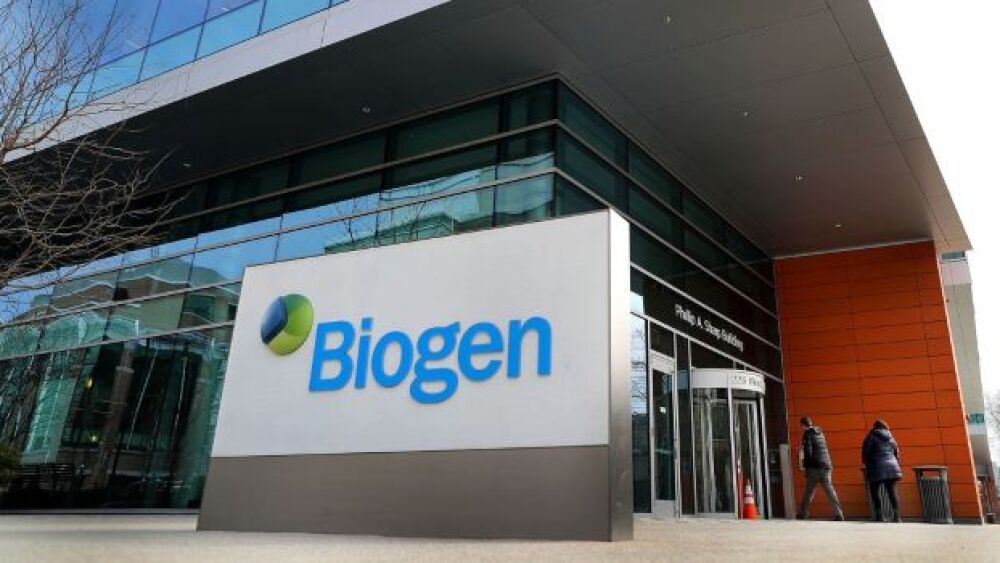Biogen indicated it has terminated an observational study of its approved Alzheimer’s drug Aduhelm after only 29 people signed up for an expected enrollment of 6,000 patients.
John Tlumacki/The Boston Globe via Getty Images
Biogen indicated it has terminated an observational study of its approved Alzheimer’s drug Aduhelm (aducanumab-avwa) following its post on ClinicalTrials.gov.
The company issued a statement about the trial that read, “As a result of the national policy for coverage, it is expected there will be limited aducanumab-avwa prescription and usage in routine clinical practice, making the study not feasible for enrollment.”
The study was to be a prospective, single-arm, multicenter, non-interventional study of the drug as prescribed in the U.S. in a post-marketing setting. Patients would receive Aduhelm as well as standard-of-care and be followed for up to five years. Data would be collected at routine visits every six to 12 months. It was designed to enroll 6,000 patients, but after seven months of enrollment, only 29 patients had signed up.
In April, the U.S. Center for Medicare and Medicaid Services (CMS) implemented its guidance for Aduhelm, limiting its availability. The agency originally issued the draft guidance in January, allowing several months for public responses. The guidance restricts the drug to reimbursement only if used in a clinical trial.
This was a very unusual move for a drug approved by the U.S. Food and Drug Administration. CMS also applied the guidance to an entire class of beta-amyloid-clearing drugs that have yet to be submitted for approval.
Almost everything about this drug has been a debacle for Biogen. It was approved on June 7, 2021, becoming the first Alzheimer’s drug approved in almost 20 years. Biogen and its collaboration partner Eisai had abandoned the drug program in March 2019 after a futility analysis found it would not hit its endpoints.
However, after a full analysis and discussions with the FDA, one of the trials, the Phase III EMERGE study, hit the primary endpoint at the highest dose. It demonstrated a significant decrease in clinical decline. Still, the data was very complex and not without its controversies.
The FDA’s Peripheral and Central Nervous System Drugs Advisory Committee voted against recommending the drug in November 2020. The agency approved the drug anyway under an accelerated approval program that would require a post-marketing study to prove clinical efficacy. The approval was based on biomarker data showing the drug cleared beta-amyloid in the patients. The drug also has been connected to some potentially lethal side effects, especially amyloid-related imaging abnormalities (ARIA), which can lead to cerebral edema and death.
The drug was performing significantly below expectations even before the CMS decision, reporting only $300,000 in third-quarter 2021 sales, largely due to the reluctance of payers to reimburse for the drug, which was initially priced at $56,000 per patient per year. Fourth-quarter sales were only $1 million, well under early projections of $10.79 million, with peak projections of $9 billion. To improve uptake, Biogen had cut the price in half to about $28,000.
In March 2022, Tokyo-based Eisai pulled out of its partnership with Biogen on Aduhelm, amending their existing deal. Starting January 1, 2023, Eisai will receive tiered royalties based on net sales instead of sharing global profits and losses. The royalties start at 2% and hit 8% when annual sales surpass $1 billion.
Starting at the signing of the amendment, Biogen’s existing final decision-making rights on the drug shifted to sole decision-making and commercialization rights globally. Otherwise, economic arrangements in 2022 are staying materially unchanged. Eisai’s share of expenses will be capped at an agreed amount for development, commercialization and manufacturing costs for the drug for the entire 2022 calendar year.
The companies will continue working to develop and commercialize another Alzheimer’s drug, lecanemab. Eisai is leading that program with final decision-making rights, with Biogen co-commercializing and co-promoting it.
Biogen is still running the Phase IV ENVISION study as a confirmatory analysis for Aduhelm’s accelerated approval. It is not expected to read out until spring 2026 if enough people enroll. It plans to enroll about 1,500 patients with early Alzheimer’s disease and confirmation of beta-amyloid pathology.





